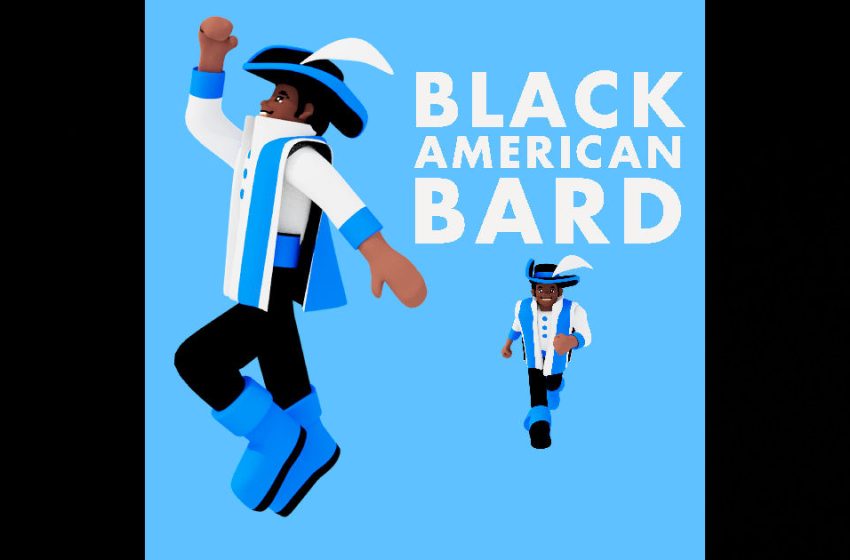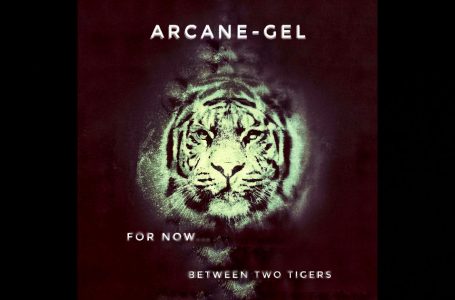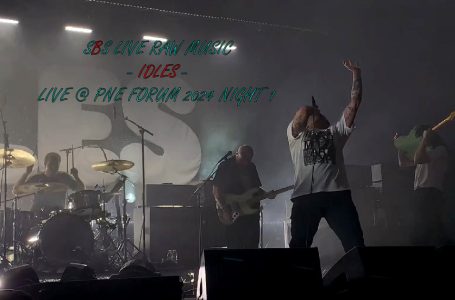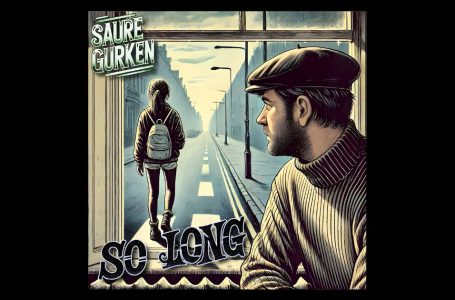Ronald J. Fontenot – Black American Bard

Ronald J. Fontenot – Black American Bard – Album Review
While there’s always the possibility that just about anything will end up in my inbox and my speakers at any given point in time, I will completely admit that the Fantasy/Modern Medieval genres are still likely to be the least expected. It does occasionally happen, but it is definitely amongst the rarest I know of.
Whatever I might have been expecting, “Fairytales” was probably more enjoyable than what I assumed I’d be listening to…I think. Don’t get me wrong, I fully respect this…highly unique path that Fontenot has decided to take with his music…but I am realistic about this still being a tougher sell than most music would theoretically be. It is what it is – Ronald’s in extremely niche terrain when it comes right down to it, but lyrically, he makes a case for this being more universal than you’d assume, given that “Fairytales” have been a part of all of our worlds at some point along the way. He’ll take you through a whole list of’em on “Fairytales” from references to Aladdin, Jack And The Beanstalk, the Wizard Of Oz, and so many more. Ultimately, what Ronald’s written is true – “Fairytales” have touched all our lives in their own unique way, but chances are, they’re still responsible for some of the most vivid memories that you’ve got from your childhood to this very day. The irony in this is not exactly lost on me, though I’m sure it’s not necessarily intended specifically either…but the reality is, the most likely place to find a song like “Fairytales” would actually be within one, you feel me? It’s hard to imagine the other places that music like this would get properly recognized or listened to…I’m just being real with Ronald in the sense that it’s not like you’d find people rocking out to Black American Bard on their way to the 9-5, but I can’t imagine he doesn’t know that already. So if this resonates with you, rest assured, it’s FOR you.
In a way, “Lord Of The Rings” is kind of the perfect way to sum up so much of what you’re experiencing when you listen to an album like Black American Bard. Think of it like this…because it really comes down to something as specific as this question – do you like “Lord Of The Rings?” If you answered yes to that question, like I’d assume most folks would, you at the very least stand a chance of enjoying what you’ll find on this record filled with folktales and fantasy-based stories you’re familiar with. If you answered no, then to be real with ya, I think your odds of digging an album like this would be extremely low – I’m not claiming you’ve got poor taste, I’m not saying you don’t know what you should like…I’m simply saying that if you’re so far removed from the Fantasy section of what you like in books and movies, that it’d be way tougher for you to find your way into an album that so proudly embraces all that stuff. Even myself, like…I enjoyed the whole Lord Of The Rings trilogy, and even made a modest attempt to read The Silmarillion as a teenager too if I recall correctly…but there’s a massive chasm of difference between someone like myself that enjoys the series of books & movies and a guy like Ronald that has dedicated a significant portion of his life writing music about how much he likes that stuff, you know what I mean? To his credit, Fontenot’s words are poetically written, observant, and accurate to the themes he chooses to write about…so in the case of something like “Lord Of The Rings,” you kinda get the Coles Notes of the series and would have a great idea about what it’s all about if you were one of the last people on Earth that has yet to see the movies or read the books. Now it’s in song form, and you’ve got yet another chance to be immersed in Tolkien’s world, through Ronald’s “Lord Of The Rings.”
Thematically, “Michael Jackson Tribute” ends up being the most curious inclusion really. Everything else that’s on this record is pretty much tied to some kind of early folklore or tale you likely know from way back in the past…”Peter Pan” & the “Sword In The Stone” and such…which makes “Michael Jackson Tribute” end up standing out in this very specific lineup and style of tunes. To be fair, I can understand the tie-in…MJ was of course, known as the King Of Pop, so if we’re already talkin’ about lords and all that renaissance based stuff, then credit where credit is due, Ronald found an interesting way of bringing in another idea that’s definitely on the fringe of the main theme, but included it cleverly in that regard. I was probably a little bit surprised that the sound of the song itself didn’t really have any tangible tributary qualities to it, but the lyricism is all about MJ’s conquest of music’s history as we know it. All that’s intact…I suppose I was just expecting Ronald to break out a few Jackson-esque moves in the music to mirror the inspiration for this song, but he leaves it to his words to do the talking for him in this tributary tune instead. I do like the vocal melody in this track and would likely argue for it being some of the record’s most unique in that regard. Tim Moyo is singing these songs by the way…we’ve crossed paths with him before on a Good Spells track back in 2022, and I’d assume he’s a musical gun for hire of sorts. Look…he’s a fantastic singer – I think he’s exceptional when it comes right down to it, and he shows such a wonderful combination of professionalism and technique in the way that he approaches the music he’s on. He’s got no easy task here – listening to “Michael Jackson Tribute,” heck, I’d even tell ya that it’s not Tim’s most even performance from start to finish, but there ARE significant highlights in this song that are absolutely amazing, and when you consider how tough it is to not only sing someone else’s words to begin with, but how that difficulty is compounded when trying to sing in a certain style, like in medieval times in this particular case…I mean, you gotta hand it to the guy for getting things as close to perfect as they are. I dig this cut though…I feel like it was a real smart curveball to put on this album, but between Tim’s vocals and Ronald’s writing, its existence in this lineup becomes justified.
It’s a really unique record in today’s world, at the very least. I’d be interested in what Ronald is aiming for when it comes to his target audience in making Black American Bard. Personally, I grew up as a kid listening to all kinds of old-school records that were geared towards learning about Fantasy through music…you know…Puff The Magic Dragon and all that…but even stuff like Pinocchio or Robin Hood, I had those stories delivered to be in audible form more often than not as well. That was of course, sometime ago now, and I don’t know that I could say I’d necessarily seek that kinda stuff out now as an adult, but I’m not ruling out the possibility that some would. I guess what I’m getting at though, is that I hear a cut like “Peter Pan” and it takes me back to those early days of learning stories like these for the first time – and if gearing this record more towards kids was the goal, I’d suspect that Ronald could find a decent amount of success with that audience. Not so much because the music is necessarily childlike – that’s not what I’m saying – I’m speaking more about this being an effective way for people to learn about the tales of someone like “Peter Pan” for the first time, and that would typically mean it would be appealing to a younger crowd. I really don’t know what to say on behalf of the rest of us…a record like Black American Bard would make for an interesting & engaging listen for sure, but I feel like there’s almost no escaping the fact that it’s so highly specific that it appeals to about one mood of all the many we could be in, and anytime that’s the case, it makes it harder to envision how it could become daily listening, even when it’s still put together as well as what you’ll find on this record genuinely is. The effort is here for sure, but there’s no argument to be made on how hard it is to get the attention of listening ears.
Obviously, there are a lot of tie-ins to a theatrical/musical-type of sound at the core of all this…in fact, I don’t know that you’ll find too many Fantasy-based records that wouldn’t end up feeling that way. It’s a performance-minded type of album, and I swear if you close your eyes as you listen, you can imagine what these songs would look like onstage in the middle of some kind of play – take “Raise The Sails” for example. Mind you, I don’t think there’s a single song on Black American Bard that doesn’t lean into that aspect of its sound any more than the rest do…”Raise The Sails” is a good example for sure, but so too would every track on this album be too. I do like the level of triumph & adventure you hear in a track like “Raise The Sails” – it’s the kind of song that seems to really emulate this exploratory feeling you can imagine would have come along with being a pioneer or making your way to new parts of the world. So much of this track rests firmly on Tim’s shoulders, as “Raise The Sails” feels a lot more bare than so many of the rest by comparison…it’s really the vocal melody that forms this entire song at its core. The rest, musically, is more of a slight suggestion or gentle complement to what’s happening on the microphone, which ultimately does make a whole lot of sense when you think about it. Like when I was explaining earlier about what a huge undertaking a task like this would be, even for someone like Tim who I’m sure has experience singing just about everything you can think of – he’s still singing Ronald’s words, and I’m not all that convinced I’m hearing much compromise. Whereas there is often a bit of back & forth between the writer and the singer…like, sometimes a singer will need a word or two changed to help them get the best out of the potential in the melody…I’m not really hearing that here. Of course, I don’t know all the details & whatnot, but given the level of difficulty presented in the melody and how not every word in the lyrics is adherent to the necessities of a rhyme-scheme & such, we kinda have to assume that the words you hear, are precisely the ones Ronald has written and intended, without that someone crucial back & forth & last minute changes. That’s where you know it comes in handy to have a guy like Moyo on speed dial, because he’s a natural problem solver, and while it might be more noticeable for us critical types, most listeners won’t realize the degrees of difficulty there would be in singing a song like “Raise The Sails,” or indeed the vast majority of these songs overall.
It’s very consistent stuff…and that’s gonna work both for, and against Black American Bard. On the one hand, when you get to a song like “Renaissance Fair,” you can’t help but notice the authenticity and how identifiable something like this would be to the original medieval times & whatnot. On the other hand, even most trained ears among us would be curious if they only had like, five songs way back then, and I might even be being generous on the count. Everything seems so derivative from the core medieval sound, and it’s probably a whole lot harder to create the kind of deviation and versatility you’d think. For the average everyday listener out there, they’re gonna hear some kind of take on “Greensleeves” in half these tunes, and rides at the “Renaissance Fair” from their childhood if they were lucky enough to have one come through town…and admittedly, even when things are different, they still seem similar. Of course, it was a much simpler time back then…but we’re not there anymore…now there are so many artists/bands from the beginning of time in music’s history for us to listen to, it’s a record like this is gonna half to be ready to battle for its rightful share of the attention. No disputes from me on quality, I feel like Ronald and Tim have that all locked down tight…and no disputes from me on the educational potential here…whether or not it’s all based on “Fairytales,” there’s still a lot of value in learning the stories that Fontenot has written about so intricately and so poetically. Outside of that, and outside of the musical realm, Black American Bard faces a mighty uphill battle in reaching its potential listeners.
While the diversity appears in pieces and fragments from the music to the microphone, the stories and themes are always noticeably different, and that might end up playing to Ronald’s advantage, though even that is a little unpredictable. Like…take myself as the litmus test and an example – the story of “Robin Hood” has ALWAYS been interesting to me, and no matter which iteration it’s in, be it Disney’s classic, or Costner’s 90s film, or comics, books, or even Ridley Scott’s less tangible adaptation – I like or love it ALL, so of course, Fontenot’s “Robin Hood” naturally appeals to me as well. But while that specific tune stands a much greater chance of appealing to me, there’s gonna be just as many or more that dive into storylines & characters I’m less interested in, or even worse, might not be interested in at all. I’d imagine most folks out there are gonna feel fairly similar, but that always gives whatever our favorite story might be, the most significant chance of appealing to our ears here in song form. I like listening to the details of “Robin Hood,” and if anything I suppose I was surprised it was one of the shorter tracks on the album. A minute & forty-six seconds? Ronald…”Robin Hood” should get his own album my brother! We’re just scratching the surface of how much awesomeness he could write about.
Yeah…you know…again, I’m listening to this album from a writer’s perspective, and a singer’s as well. I admire the way that Ronald writes and says things exactly how he’d want to say them. I marvel at the fact that Tim has been able to adapt to them so proficiently…it’s almost like he had to tackle these tunes syllable by syllable, but ever the professional, he figured out how to do so extremely hard things with the material he’s working with here. One of the toughest things to do is find your space as a singer when you’re singing someone else’s words – because to the writer, the words are always going to be the star of the show…but it’s the singer that brings the words to life, and they need a bit more freedom than they typically get in the writer/singer relationship. Like, for myself personally, “Storyland” has one of the biggest highlights and most appealing moments on this entire record, and it occurs right at the end of the song when Tim is just singing vocalizations, not words. Obviously, for Ronald, his goals would have been different in terms of what he’s hope would appeal to us most as listeners, and I understand that. All I’m saying is, finding the real balance that works takes time, but the time it takes makes it all that much more enticing to listen to, and is always worthwhile when it comes to the end results and its potential accessibility. No one’s gonna know what they’re capable of singing better than the person that is actually singing the song…so if they’re looking for some kind of compromise, it’s often better to find a way to make that happen when it comes to vocal patterns, melodies, metering, and the ol’ phonetic stuff. Ronald’s done a decent job of finding the right way to compose lyrics to these tunes and keeps the amount of curveballs down to a minimum from what I can tell, but there’s always going to be a few when you’re as specific and intentional with your words as Fontenot is. Anyhow…even if you’re just supplying a couple spare seconds to let a singer sing how they would & help fill the space with their natural talent, I think it’s always worthwhile. I love the ending to “Storyland” and listening to Tim sing.
I’m always realistic…so perhaps that in itself makes it tougher for me to critique an album so dedicated to the Fantasy realm. While I might think it’s going to be harder for the average everyday listener to find their way into an album like Black American Bard, I have to recognize that I’ve also been listening to this record on repeat and throughout much of this week as well…so I’ve kinda reached my fill on the whole medieval sound at this point, be it Ronald’s or someone else’s. Having said that, if you were just coming to the album on your own, Fontenot’s actually only asking for about thirty-six minutes of your time, and in a shorter span of time like that, chances are, you’ll appreciate how the craft and artistic presence would more likely be your main takeaways in listening to Black American Bard. “Sword In The Stone” was up there with the best on this record for myself personally…partly because it’s once again a story that appeals to me & my childhood memories, but also because there is more tangible diversity to be found in the structure & way that this particular track moves by comparison to the rest. Ronald makes a strong case for why you wanna be packin’ a sword around back in the day, and definitely makes it clear about how tragic it would be if you left it at home before you were heading out to the arena that day. Like I said…there’s a high level of focused craft in what Ronald’s creating, and I’d never take that away from the guy. I appreciate the art in what he creates. If he likes this album and how everything has come out, I’d say that’s the most important thing of all…and if others happen to connect with what he’s created, that’s a bonus. He ain’t gonna be alone – there are lots of folks out there that would get something unique out of listening to this music, it’s just gonna be harder to get them to find this record.
“The Fox And Bear” is the longest track on the album, clocking in at nearly five minutes in length. I’m highly impressed by the choices made for the vocal melody, and probably equally impressed by the fact that Tim was able to so consistently reach for the top shelf of his upper register to get this song where it needed to go. I also liked the layered/call & answer type of approach heading towards the third minute as well, which resurfaces later on for the finale of “The Fox And Bear” as well. Essentially, while we might have some debate about what we hear on this record and where the hooks are, to me, “The Fox And Bear” was the first cut on Black American Bard that had discernable hooks most listeners would catch onto. Heck, they might even sing along with this one…and that might be a key part of the blueprint for the pathway forward if Ronald wants to continue creating these kind of tunes – there’s something decisively different about “The Fox And Bear” that will likely appeal to the widest audience, because it does lean a little more towards modern-day hooks from about the halfway mark, to its end. Storyline-wise, I enjoyed this too…I’m not familiar with “The Fox And Bear” or their dragon-fighting ways, but here we are, and I’m a more learned man for having listened to this tale. I also like the music from that halfway point as well…love the way Tim sings the hooks…yeah…I feel like this particular track likely stands the best chance of being the most universally loved song found upon Black American Bard. I really think it’s Moyo’s best performance on the lineup, but again, I think this is where you find that Ronald & Tim have found that all-important middle ground that lets the writer’s words get out as they’re intended to be, but also provides the space for the singer to sing freely and unencumbered.
It’s gonna be interesting to learn about the reaction to this record from the average everyday listeners out there. On the one hand, you gotta admire Ronald’s writing and how true it is to the style of how people wrote way back in the day – and on the other, you have to recognize that he’s using a plethora of words that don’t even show up that often in our everyday speech in this modern-era. I mean, hell, most folks are using emojis to say what they want these days, so believe me, it’s already tough enough for the writers among us to get people to read or listen to what we’re saying…and it just gets progressively harder from there the further back you go with it all thematically. Having said that, there are numerous period-pieces we can point to that prove the past still has an audience. Is that easier to establish with a visual presence than it would be in audible form? Ronald’s learning about that right now, and he’d have a much better idea than anyone else would about that based on whether or not people are coming out to listen to Black American Bard on the regular…so you’ll have to ask him. I really like how it feels like some of these ideas have expanded and found a bit more diversity to them in the second half of the record…like, I freakin’ love the ending to “The Frog Prince,” which just kinda drifts out dreamily at the end when it’s wrapping up. Before that…I feel like by track eleven I’m usually starting to reach my fill on how much flute-based music I can take in a day, or my personal threshold for the medieval sound. The stories themselves continue to be interesting, and credit to Ronald for detailing tales like “The Frog Prince” in a way that keeps the material engaging on that level. I do want more versatility and variety than the medieval vibes are likely capable of creating, but who knows…maybe that’s just the way I feel?
I ain’t gonna deny that if you’re really out there looking for a set of new medieval tunes, a record like Black American Bard wouldn’t deliver exactly that for ya. The more specific anything is, the greater the risk of its niche appeal becoming the dominant trait…and that is indeed the case here. “The Young Forest Man” isn’t gonna be the track to convince you that you were looking for medieval music all along, you know what I mean? You already made that decision by track two and realizing what Black American Bard was gonna be…so if you continued on from there, it’s truly because this is something you’d like to listen to. No judgments here y’all…we all like what we like and love what we love…I fully respect what has to be an incredible love of the past, of fantasy, and of the whole medieval sound that Ronald has. In my heart of hearts, I know he’ll eventually draw the people out there in to listen to this record, it will just likely take longer than it would for most records given its level of specificity. “The Young Forest Man” is as good of an ending as any of the others could have been…I’m not really hearing any significant attempt for this to be a finale that stands out from the rest, or a song that provides a more conclusive nod to the experience being over than any of the other tunes would have naturally created. It’s simply another song in the series here…and if you like what you’ve heard, you’ll keep on listenin’ right through to the end. The quality is consistent, the focus is about as sharp as you’ve ever heard an album tailored to be, the lyricism is insightful & poetic, and the vocals & music are good too…I wish that all equated to an album easily finding its way out there in the world, but Black American Bard might very well be proof that that’s never easy under any circumstances. It’s a unique record to listen to though, and there’s always value in checking something out that’s different than what you’d normally choose to put on. Black American Bard is definitely different in that regard, but that might be just what you’re looking for.
Find more music by Ronald J. Fontenot at his official YouTube channel here: https://www.youtube.com/channel/UCXLLF1InpAW3ChZCWTmbYdw
Fun fact – did you know some of the most capable minds and amazing musicians you’ve ever known STILL can’t find the best way to submit their music to us? You’d think it’d be easy, given that it’s right there on the main page of our site, yet the battle still continues! Click here to be the next up on our pages – it’s really that simple!






